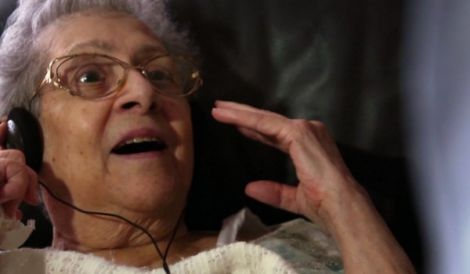Reviews / Screenplay: ‘Of course we are all alive inside’
MUSIC. What does it mean to me? What does it mean to you? Which songs find a path into your heart and make you come alive? Your answer will be completely different to mine, opposite ends of the soundscape perhaps.
We all have our own unique relationship with music. It is inside all of us – music stimulates us, it connects us with ourselves and with our memories.
Thursday night’s showing of the documentary ‘Alive Inside’ at Mareel as part of Shetland Arts’ annual Screenplay film festival showed the true extent of this.
The film followed Dan Cohen – founder of the non-profit organisation Music and Memory – visiting nursing homes in America that house patients with diseases ranging from Alzheimer’s to multiple sclerosis to Schizophrenia.
Dan had a simple objective: to bring back some life, joy and memories into the homes’ residents through handing them an iPod. The responses of some of the people were truly miraculous: Henry, who barely said anything, was suddenly singing and Denise was crying and dancing at the same time. It was as though a light had been switched back on.
It only took a few seconds of song for these people to find some emotions once again and to – in a sense – “connect with themselves”.
All music enters the brain through its emotional regions – primarily the frontal lobe, which is also involved in our personality, behaviour and the storing of long-term memories. Music also stimulates the cerebellum – the part of the brain responsible for movement amongst other things.
It is very simple: think about a song you like and where it takes you; what it does to you.
Not only was the film deeply moving in this sense, but director Michael Rossato-Bennett also managed to get across a number of important messages.
In America’s health system (and perhaps in most other western societies?) it is the norm to produce and prescribe billions of pills in order to keep people lying in a hospital bed staring at the blank walls, either unable to communicate or not wanting to communicate and withdrawing due to their surroundings – is this what “being alive” is nowadays?
Become a member of Shetland News
There is the money to do this, yet there is not the money to give every patient in a care home a set of headphones and an iPod as this is not seen as “necessary medication”.
Surely this cannot be? A person’s spiritual and mental wellbeing is equally important than their physical wellbeing: because if we are not alive in our heads and our hearts then what is the point of living at all? Thus is the sad reality of America’s broken health care system.
Another fact the documentary focused on was how in society today, the elderly have no place. We just accept them as “old people in homes”, as “less amazing versions of their adult selves” and don’t give it much further thought.
Yet we are the elderly generation of tomorrow. Is that how you want people to view you 50 years down the line? I thought not.
Old people have lived: they do have something to give; they do have stories to tell. The number of elderly people is rising and the number of those with mental conditions such as Alzheimer’s is at shockingly high rate. Attitudes need to change.
Above all, the film was so powerful as music is something so simple and everyday. It’s everywhere in our lives and we all take it for granted: in the shower, in the car, in the pub.
And yet we couldn’t imagine our lives without music; it has the ability to ignite another’s soul who is whiling away their final days in some institution: a patient; a statistic. But surely not a human being anymore.
Of course we are all alive inside.
Katarina Duernberger
Become a member of Shetland News
Shetland News is asking its readers to consider paying for membership to get additional perks:
- Removal of third-party ads;
- Bookmark posts to read later;
- Exclusive curated weekly newsletter;
- Hide membership messages;
- Comments open for discussion.
If you appreciate what we do and feel strongly about impartial local journalism, then please become a member of Shetland News by either making a single payment, or setting up a monthly, quarterly or yearly subscription.





























































